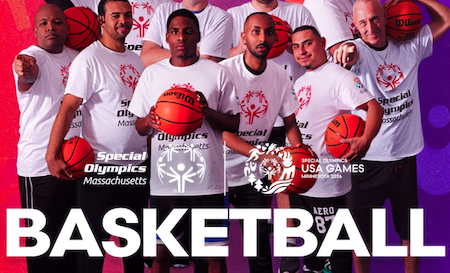
May is Mental Health Awareness Month—a time to reflect on the importance of emotional well-being and the resources available to support it. For athletes, mental health is just as important as physical fitness. That’s why Special Olympics Massachusetts introduced Train 4 Life: a holistic wellness program that integrates fitness, nutrition, and mental health to help athletes thrive on and off the field.
Train 4 Life is a community-driven experience designed for athletes ages 18+. Each week, athletes participate in group workouts tailored to their abilities, receive guidance on healthy eating, and learn strategies to manage stress. What’s most notable from the program, and what makes it standout from traditional fitness classes or bootcamps, is its dedication to mental health.
Athletes in the Train 4 Life program learn techniques to manage anxiety, build positive habits, and foster a growth mindset. Most recently, program participants kicked off Mental Health Awareness Month with Strong Minds Clinical Directors Dr. Angela Massey and Dr. Joe Somodi by discussing mental wellness and specifically, rest, sleep and breathing.
“This is important because rest and sleep is one of those areas that we don’t think about as much when we’re busy doing our sports, thinking about our fitness, and being healthy, said Dr. Massey. “We don’t always think about the importance of slowing down and giving our minds and bodies a chance to rest and recover.”
Rest
At Special Olympics Massachusetts, we know athletes hustle hard; but don’t forget that rest is part of training too! Rest doesn’t mean you’re being lazy—it means you’re giving your mind and body the chance to recharge, refocus, and come back stronger.
- Rest is a mental break
- It is not the same thing as sleep
- Can be 2-20 minutes in length
- It reduces stress and gives you the opportunity to be more active, while boosting your immune system
- Can include: family time, listening to music, watching T.V., chatting with friends, reading, coffee/tea break, meditation/yoga, playing instruments, sitting outside
.jpg)
Sleep
Your body and brain need sleep to repair muscles, store memories, boost mood, and get ready for another big day on the field. Without enough sleep, even the strongest athletes will feel off their game.
- Sleep gives your body and brain rest and allows us to prepare for the next day
- Hours of sleep we should be getting each night by age group: 5-10 year olds need 10-11 hours, 11-17 year olds need 8.5-9.5 hours, 18+ need 7-9 hours
- To get quality sleep, people should establish a nighttime routine, turn off phones and electronic devices before bed, dim the lights avoid meals, caffeine or sugary foods 1 hour before bed
Breathing
You’ve probably heard it before: we can survive days without water, weeks without food, but only minutes without oxygen. That’s how important breathing is—not just for staying alive, but for performing your best both in sports and in life. And it’s not just about taking a breath…it’s about how you breathe. The right breathing technique can help you feel stronger, calmer, and more in control when competition (or life!) heats up.
So, what’s the best way to breathe?
- In and out through the nose. Your nose is your built-in air filter. It warms, moistens, and cleans the air before it hits your lungs.
- Slow and steady. Rushing your breath can leave you feeling winded and stressed. Take your time. Your body will thank you!
- Low and deep. Breathe into your belly, back, ribs, and lungs—not just your chest.
What about mouth breathing? Mouth breathing is actually not ideal. It dries out your airways, irritates your nose, and lets unfiltered air sneak in. Stick with nose breathing to keep your body balanced and ready for action.
Essentially, the diaphragm is the MVP of your breathing team. When you breathe the right way, the diaphragm supports your lungs and helps stabilize your spine. That means better posture, more oxygen for endurance, stronger recovery after games and workouts.
“Your diaphragm is the most important muscle when it comes to breathing. It is the primary muscle that helps you breathe,” said Dr. Somodi. “You’re increasing lung volume, the capacity of your lungs, which you need for exercise, which you need for your sport, which you need for endurance, which you need for recovery.”

Athletes even got to check out a video showing how the diaphragm moves and how it helps other organs in the body work better.
“The way I watched the video, I loved learning that the diaphragm supports the lungs when the diaphragm expands to lift the lungs up, it’s very interesting,” said Special Olympics MA athlete Lumene Montissol. “It helps support the lungs and the heart together.”
Want to practice nose breathing like a pro? Try this:
- Exhale slowly through your nose
- Pinch your nose and hold your breath
- Gently nod your head up and down
- Hold until you feel a medium-to-strong urge for air
- Let go and breathe calmly through your nose
- Repeat and feel the calm kick in
This Mental Health Awareness Month, let’s remember that wellness is a journey best taken together. Programs like Train 4 Life show that with the right support, everyone can achieve their full potential.
Inclusive health content is sponsored by Tufts Health Plan, the Official Health Insurance Partner of Special Olympics Massachusetts. Tufts Health Plan and Special Olympics Massachusetts are dedicated to promoting healthy lifestyles through resources that support individuals with and without intellectual disabilities. To learn more about Tufts Health One Care, a health plan for those with disabilities who have Medicare and Medicaid, visit TuftsHealthPlan.com/SOMA




.jpg)

.jpg)
.png)



%20logo%20sm.svg)
